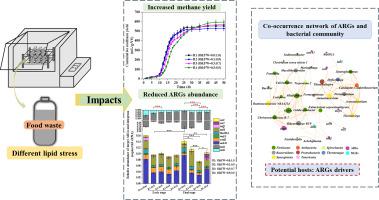Science of the Total Environment ( IF 8.2 ) Pub Date : 2020-11-21 , DOI: 10.1016/j.scitotenv.2020.143846 Jiaying Ma , Panliang Wang , Wenchao Gu , Yinglong Su , Huawei Wei , Bing Xie

|
The dissemination of antibiotic resistance genes (ARGs) in food waste (FW) disposal can pose severe threats to public health. Lipid is a primary composition in FW, while whether lipid stress can affect ARGs dynamics during anaerobic digestion (AD) process of FW is uncertain. This study focused on the impacts of lipid stress on methane production, fate of ARGs and its microbial mechanisms during AD of FW. Results showed that high lipid content increased methane yield but prolonged hydrolysis and lag time of methane production compared to AD of FW without oil. Moreover, variations of ARGs were more susceptible to lipid stress. Lipid stress could facilitate the reduction of total ARGs abundances compared to the group without oil, particularly restraining the proliferation of sul1, aadA1 and mefA in AD systems (P < 0.05). Mantel test suggested that integrons (intl1 and intl2) were significantly correlated with all detected ARGs (r: 0.33, P < 0.05), indicating that horizontal gene transfer mediated by integrons could be the driving force on ARGs dissemination. Network analysis suggested that Firmicutes, Bacteroidetes, Synergistetes and Proteobacteria were the main potential hosts of ARGs. In addition, under the lipid stress, the reduction of host bacteria was responsible for the elimination of several specific ARGs, thereby affecting ARGs profiles. These findings firstly deciphered ARGs dynamics and their driving factors responding to lipid stress during anaerobic biological treatment of FW.
中文翻译:

在食物残渣的厌氧消化过程中,脂质压力会影响性能,抗生素抗性基因的命运以及微生物动力学吗?
在食物垃圾(FW)处理中传播抗生素抗性基因(ARG)可能对公共健康构成严重威胁。脂质是FW的主要成分,但在FW厌氧消化(AD)过程中脂质压力是否会影响ARGs动力学尚不确定。这项研究集中于脂质胁迫对FW期间甲烷产生,ARGs命运及其微生物机制的影响。结果表明,与不含油的FW相比,高脂质含量增加了甲烷的产量,但延长了水解和甲烷生成的滞后时间。此外,ARG的变异更容易受到脂质压力的影响。与不加油的组相比,脂质应激可以促进总ARGs丰度的降低,特别是抑制sul1,aadA1的增殖和AD系统中的mefA(P <0.05)。Mantel测试表明,整合素(intl1和intl2)与所有检测到的ARGs均显着相关(r:0.33,P <0.05),表明整合素介导的水平基因转移可能是ARGs传播的驱动力。网络分析表明,菌毛,拟杆菌,协同菌和变形杆菌。是ARG的主要潜在宿主。此外,在脂质压力下,宿主细菌的减少是消除几种特定ARG的原因,从而影响ARG的概况。这些发现首先破译了AWs动力学及其驱动因子对FW厌氧生物处理过程中对脂质压力的响应。











































 京公网安备 11010802027423号
京公网安备 11010802027423号